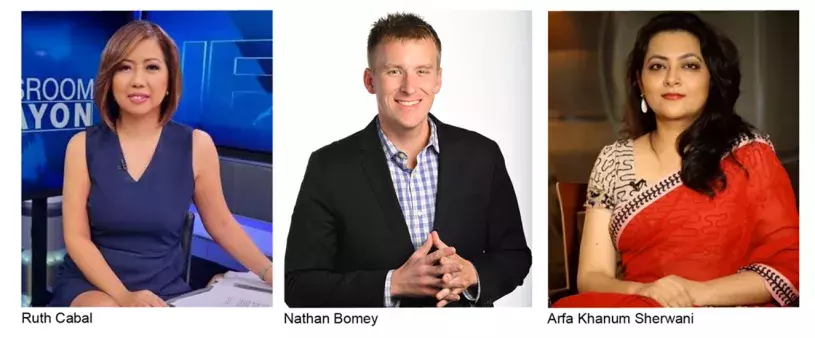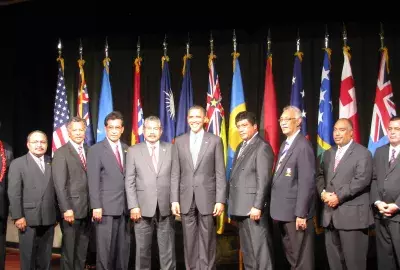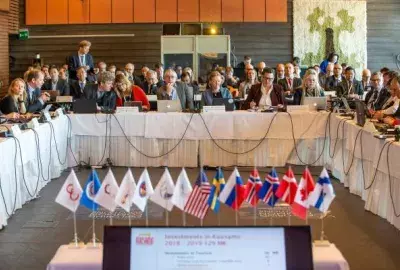Error message

OFFICE/DEPARTMENT
Journalists from India, the Philippines and the US raise alarms over the state of representative rule
HONOLULU (July 5, 2022) — Threats to democracy across the world connected three journalists from the Philippines, India, and America as they each recounted the challenges and uncertainties their nations have been facing during a panel discussion on “Democracy Thrown Off Balance” at the recent East-West Center International Media Conference.
Speaking via video link from Manila just hours ahead of the inauguration of new President Ferdinand “Bongbong” Marcos Jr.—son of the nation’s former dictator—Ruth Cabal, a senior correspondent with CNN Philippines, described Marcos Jr.’s landslide election as “a test of truth, a test of history. It depends on which side you’re on or what kind of information you consume.”
Marcos Jr. gave few press interviews during his campaign and skipped debates. Journalists and human rights advocates accuse him of employing internet trolls to attack people who challenge him. The online attackers contribute to disinformation and harass those who were critical of his campaign.
Cabal commented: “As we usher in a new leadership in the country, our role as journalists remains to empower citizens with factual and accurate information, seek transparency and demand accountability.” Journalists in the country are persevering, she said, “in spite of challenges, threats, intimidation, and even the killings of our colleagues.”
Arfa Khanum Sherwani, senior editor of The Wire in India, spoke about what she called the “existential threat” to India’s democracy under Prime Minister Narendra Modi. Sherwani, who is among India’s 200 million Muslim citizens, said Modi’s government is trying to convert the country’s secular democracy into a Hindu theocracy. “There is a hate project,” she said, “a hate factory run from and furthered by news channels and newspapers to suppress any kind of resistance. It scares me. I don't want to tell young Muslims that they have no future in India’s democracy.”
Nathan Bomey, a national reporter for Axios in the US, spoke about his experience covering the aftermath of the insurrection at the US Capitol and the current possibility of criminal charges against former President Donald Trump. It would be a difficult call for the Justice Department to risk trying to convict the former president, he said, which could backfire if the prosecution isn’t successful.
Asked by an audience member whether there is some flaw in democracy itself that is leading to the election of populist leaders across the globe who then disregard democratic safeguards, Bomey said he thinks “the problem is more with the intersection of democracy with social media, because social media is what is enabling populists to control the message.”
— By Sarah Tomita, University of Hawai‘i at Mānoa
Journalists from India, the Philippines and the US raise alarms over the state of representative rule
HONOLULU (July 5, 2022) — Threats to democracy across the world connected three journalists from the Philippines, India, and America as they each recounted the challenges and uncertainties their nations have been facing during a panel discussion on “Democracy Thrown Off Balance” at the recent East-West Center International Media Conference.
Speaking via video link from Manila just hours ahead of the inauguration of new President Ferdinand “Bongbong” Marcos Jr.—son of the nation’s former dictator—Ruth Cabal, a senior correspondent with CNN Philippines, described Marcos Jr.’s landslide election as “a test of truth, a test of history. It depends on which side you’re on or what kind of information you consume.”
Marcos Jr. gave few press interviews during his campaign and skipped debates. Journalists and human rights advocates accuse him of employing internet trolls to attack people who challenge him. The online attackers contribute to disinformation and harass those who were critical of his campaign.
Cabal commented: “As we usher in a new leadership in the country, our role as journalists remains to empower citizens with factual and accurate information, seek transparency and demand accountability.” Journalists in the country are persevering, she said, “in spite of challenges, threats, intimidation, and even the killings of our colleagues.”
Arfa Khanum Sherwani, senior editor of The Wire in India, spoke about what she called the “existential threat” to India’s democracy under Prime Minister Narendra Modi. Sherwani, who is among India’s 200 million Muslim citizens, said Modi’s government is trying to convert the country’s secular democracy into a Hindu theocracy. “There is a hate project,” she said, “a hate factory run from and furthered by news channels and newspapers to suppress any kind of resistance. It scares me. I don't want to tell young Muslims that they have no future in India’s democracy.”
Nathan Bomey, a national reporter for Axios in the US, spoke about his experience covering the aftermath of the insurrection at the US Capitol and the current possibility of criminal charges against former President Donald Trump. It would be a difficult call for the Justice Department to risk trying to convict the former president, he said, which could backfire if the prosecution isn’t successful.
Asked by an audience member whether there is some flaw in democracy itself that is leading to the election of populist leaders across the globe who then disregard democratic safeguards, Bomey said he thinks “the problem is more with the intersection of democracy with social media, because social media is what is enabling populists to control the message.”
— By Sarah Tomita, University of Hawai‘i at Mānoa
Web Article
Recent online articles and analysis that have been published on the East-West Center website.







